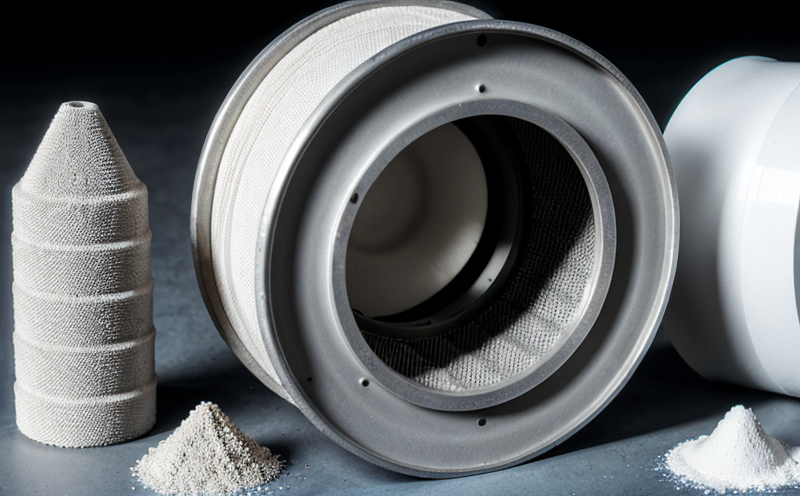ASTM D1141 Synthetic Seawater Corrosion Compliance Testing
The ASTM D1141 synthetic seawater corrosion compliance test is a critical procedure for assessing the corrosive resistance of materials and coatings used in marine and ship equipment. This test simulates the aggressive environment found in coastal and maritime settings, ensuring that the materials you specify or manufacture meet stringent durability standards.
In the context of marine and ship equipment testing, ASTM D1141 is essential for manufacturers aiming to ensure their products can withstand harsh environmental conditions such as salt spray, humidity, and temperature fluctuations. The test exposes specimens to synthetic seawater under controlled conditions, replicating real-world exposure over specified durations.
The synthetic seawater used in this compliance test closely mimics the composition of seawater with adjustments for chloride content, which is a key factor in causing corrosion. This ensures that the results are accurate and reliable reflections of how materials will perform in actual marine environments. The test is particularly important for additive manufacturing (AM) materials as it helps to identify any potential weaknesses or vulnerabilities before products reach market.
The ASTM D1141 test protocol involves carefully preparing specimens, which can be made from a wide range of materials including metals, polymers, and composites, that are common in the marine sector. Once prepared, these samples undergo immersion into synthetic seawater for defined periods under controlled temperature conditions. The testing process also includes regular visual inspections to assess any signs of corrosion.
The acceptance criteria for ASTM D1141 are based on industry standards and guidelines. Specimens that pass the test must exhibit minimal or no visible signs of corrosion after exposure, indicating their suitability for use in marine applications. This ensures that products meet not only regulatory requirements but also the high-quality expectations of end-users.
The synthetic seawater used in ASTM D1141 is carefully formulated to replicate the conditions found in coastal and maritime environments. The test setup includes a controlled environment chamber where specimens are exposed to this simulated seawater for extended periods, typically up to 28 days depending on the material being tested. This allows manufacturers to assess how their products will perform under real-world conditions.
For additive manufacturing materials specifically, ASTM D1141 testing is crucial as it helps in validating the durability and reliability of these advanced materials. Additive manufacturing has opened up new possibilities for creating complex geometries and lightweight structures that are essential in modern maritime applications. However, ensuring that AM parts can withstand harsh marine environments is equally important.
The ASTM D1141 test not only ensures that additive manufactured parts meet durability requirements but also supports the development of robust quality control processes within manufacturing facilities. By adhering to this standard, manufacturers can demonstrate compliance with international regulations and set a benchmark for product reliability in challenging environments.
Scope and Methodology
The scope of ASTM D1141 synthetic seawater corrosion testing includes the assessment of materials used in marine equipment. This involves exposing specimens to synthetic seawater under controlled conditions over a specified period, typically 28 days. The test aims to evaluate the resistance of these materials against corrosive elements present in marine environments.
The methodology for ASTM D1141 is outlined in international standards such as ASTM D1141-20 and involves several key steps:
- Sample preparation: Specimens made from various materials relevant to the marine industry are prepared according to specified dimensions.
- Seawater formulation: A synthetic seawater solution is prepared, closely mimicking the chemical composition of seawater with adjustments for chloride content.
- Immersion: The specimens are immersed in the synthetic seawater under controlled temperature conditions.
- Visual inspection: Regular inspections are conducted to observe any signs of corrosion.
The acceptance criteria stipulate that materials must exhibit minimal or no visible signs of corrosion after exposure. This ensures compliance with industry standards and regulatory requirements, providing assurance about the durability and reliability of materials used in marine equipment.
Industry Applications
- Metal fabrication for ship hulls and superstructures
- Critical components such as propellers and rudders
- Additive manufacturing parts for high-stress areas like engine casings
- Piping systems and valves in marine vessels
- Deck fittings and hardware that are exposed to salt spray
The ASTM D1141 test is particularly useful for ensuring the longevity and reliability of these components, which are often subjected to harsh environmental conditions. By simulating real-world exposure, this test helps in identifying potential weaknesses or vulnerabilities before products reach market.
For additive manufacturing materials specifically, ASTM D1141 testing ensures that parts can withstand the corrosive environment of marine applications. This is critical for maintaining structural integrity and performance over extended periods. The test results are essential for quality assurance programs and compliance with international standards.
Why Choose This Test
- Accurate simulation of real-world corrosion conditions in marine environments
- Comprehensive evaluation of materials used in additive manufacturing processes
- Adherence to international standards and regulatory requirements
- Promotes the development of robust quality control processes within manufacturing facilities
- Ensures compliance with industry norms, enhancing product reliability and durability
- Supports the validation of new materials and coatings for marine applications
- Aids in identifying potential weaknesses or vulnerabilities before products reach market
The ASTM D1141 synthetic seawater corrosion test is a cornerstone of quality assurance programs, providing reliable data that can be used to improve product design and manufacturing processes. By choosing this test, manufacturers gain confidence that their materials will perform reliably under the harshest conditions.





